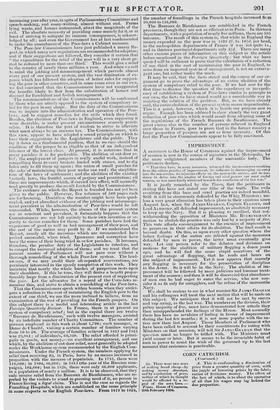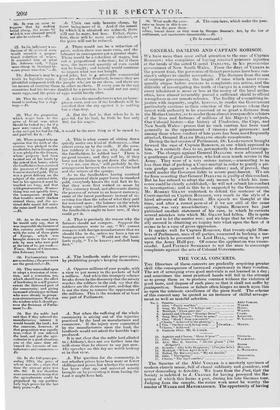CORN CATECHISM.
(Continued.)
25. There were two ways of making bread cheap—by making money abundant, and by a reduction of price, neither of which he thought would be effected by a re- peal of the corn laws. Times. House of Commons, 2Uth February 1834. A. This is confounding a diminution of price from a greater quantity of corn, with the juggle of lowering prices by the fabri- cation of fictitious money. The effect of the last of which, is to cheat the operative of all that his wages may lag behind the due proportion.
26:. It was an error to suppose that by making bread cheap, the means by which it was obtained would not also be tedneed._rb.
27. In his jail; went a ev. eactioa of th.priee of corn would occasion a impor- t I reduction of wages. It reminde4 him of what Dr. Johnson said, " Eggs were cheep in Seethed he. cause roue were few."—lb.
1.'h•. Johnson's may be a good joke, but is # miserable commercial truth. to legislate upon. Eggs are cheap in Seotland, because they are :plentiful compared with the people who are to eat doom and there are no means of carrying them to other markets. If every man in the egg -countries had his income doubled by a pension, he would not eat many more eggs, and the price of eggs would hardly alter.
2S. That the cry of cheap bread is nothing hat a clap- trap.—lb.
ao. There seemed tote an opinion that the faith of the country was pledged to the fundholder, but in his opinion it was pledged to the firmer, whose property had been twisted out of Ins hands by the acts of that house, while the fundholders have received the payment of their paper leans in standard gold. There was a great delicacy on the -subject of the national debt, but in his opinion it must be -touched ere lung, and that with great severity. If some- thing was not speedily done, the consequence would be that troubles would thicken around them, and the na- tional debt would fall under the ruins itself had created. —lb.
31. As to the corn laws, be would only say, that it was impossible the farmers of this country could compete with the corn of those parts of Europe, which was brought down to the water- side by men who were paid at the rate of ls. per week.— Times. House of Commons, 21st February lts34.
32. Parliamentary taxes. areas nothing ; the pour-rates are the great evil.—lb.
33. They werecalled upon to adopt a remission of taxa. Lion, and a remission, too, which should have the effect of burdening to a still greater extent the distressed part of the community, and giving increased advantages to those who were already an prove • eons circumstances. Vt. as that the wisdom which should go . yern the decisions of Parlia- ment ?—/b.
34. But the noble lord said that if they relieved the manufacturing interest it would benefit the land ; but the couverse, however, of that proposition was equally true, —that if you relieved the land, and put the agri- culturist in a good situation, you at the same time ad- vanced the interests of ma- nufactures and commerce.— lb.
35. In the 150 years pre- ceding 1793, the price of wheat was ;Ms. ; since that time the ;Ivo .age price was 48s. Psi. It was therefore most unreasonable to say that the agriculturists could he prejudiced by any particu- larly high prices for the last forty years.—lb. rates so heavy in this e.am- try ? Not the poor them • selves, bound down as they were by Sturges Bourne's Act, by the law of settlement, anal enactments innumerable.—./b. At .(2orn can only beeome cheap,. by there being more of it. And if the means by which it is obtained are reduced, there mill not be more, but less. Either, there- fore, there will be more corn obtained, or the twice will not be reduced.
A. There would not be a reduction of price, olden; there was more corn, and the labourer in consequenee got a greater share. '('here would be a reduction of wages, but not a proportional reduction ; for if there was, the inere 'sett quantity of corn could not be bought ; and nobody would continue to import what was not bought.
A. Give the manufacturers a tax on home- grown cone and see if the landlords will be satisfied that the cry against it is nothing but a clap-trap.
A. But the fact is, that when he is to give 64. for his loaf, he finds he has wily
M. for his wages.
A‘ This is what comes of sitting down quietly under one kind of dishonesiy,—that others creep up by the stalk. If the corn- law robbery is to go on, why should not the fundholders be robbed too? There is no good reason; and they will be, if they have not tile brains to put down the other. " Caw me, caw thee," will probably be the arrangement between the reivers of the land and the reivers of the sponge. As to the fundholders having received the payment of their paper loans in standard gold, everybody knows the real fact to be, that they were first robbed en masse by Pitt's currency fraud, and afterwards during the process of return to an honest currency, some of the latest purchasers instead of re- ceiving less than the value of what they paid for received more; the balance on the whole being some eight millions and a half, which the fundholders ought to have now, if they could get it.
A. That is precisely the reason why the farmers should not compete. Suppose the manufacturers were to say, " We cannot compete with foreign manufacturers that we should like to do, unless we have a tax on home-grown corn." Would not the land- lords reply, " Ye be knaves ; and shall hang first."
A. The landlords make the poor-rates; by prohibiting people's keeping themselves.
A. Oppress millions of your people, with a view to put money in the pockets of half a million. And when this trumpery scheme breaks down by the discovery that the misery reaches the robbers in the end, say that the robbers are the distressed part, and that this is not the time to remove the oppression of the millions. This is the wisdom of at least one part of Parliament.
A. Not when the suffering of the whole community is arising out of the injustice practised by the land on manufactures and commerce. If the injury were committed by the manufacturers upon the land, the landlords would not admit the horrible logic produced.
It is not clear that the noble lord alluded to ( Althorp), does not see farther into the mill-stone than he chuses to say just now. llis speeches on this day are worth looking at in that view.
A. The question for the community, is not whether prices have been more or fewer shillings and pence, but whether the country has been shut up, and universal misery brought on hue preventing it from having the food it might have had. 26. What made the poor- . A. The corn-laws, which make the poor.
(7o be continued.)

















 Previous page
Previous page